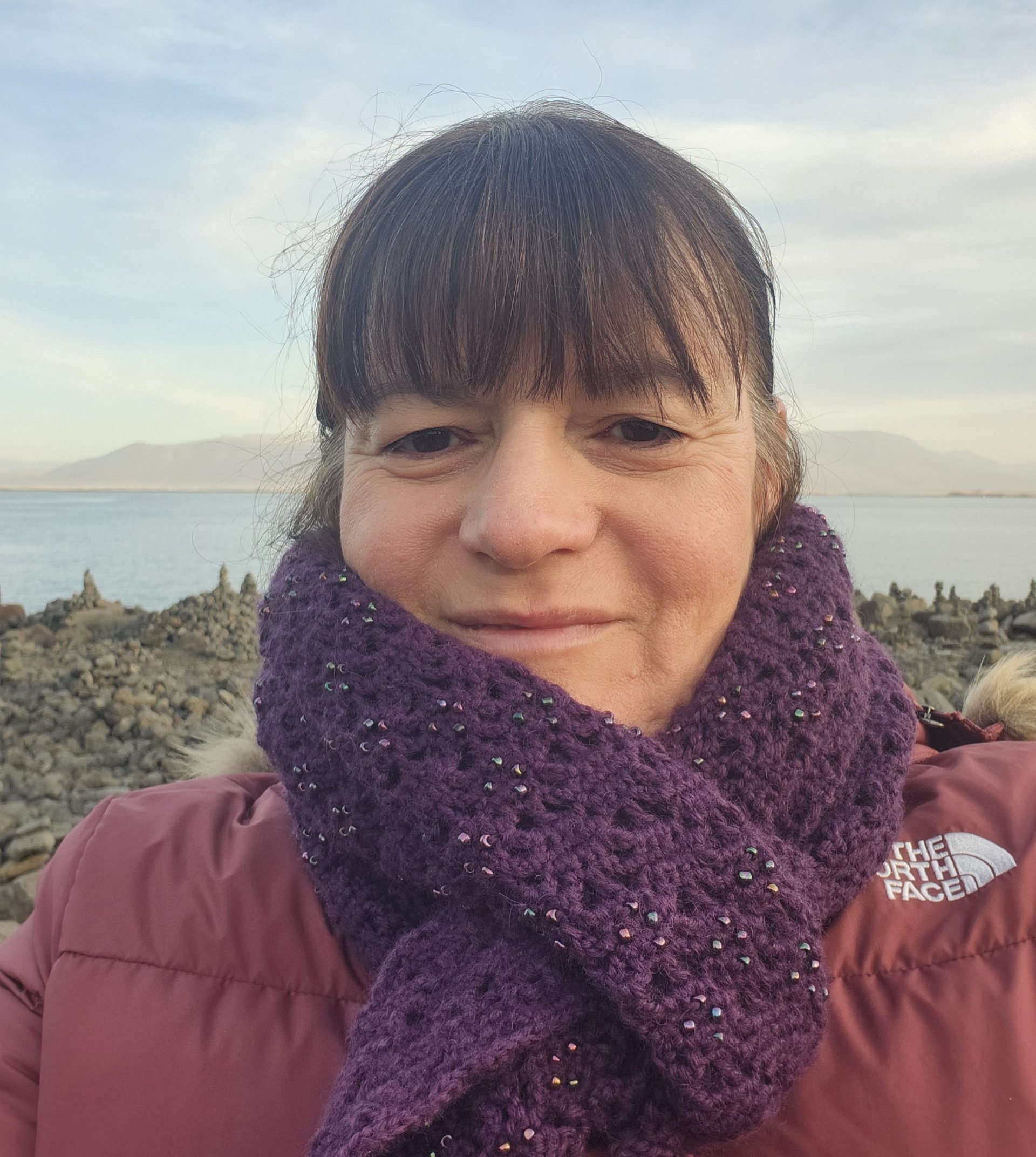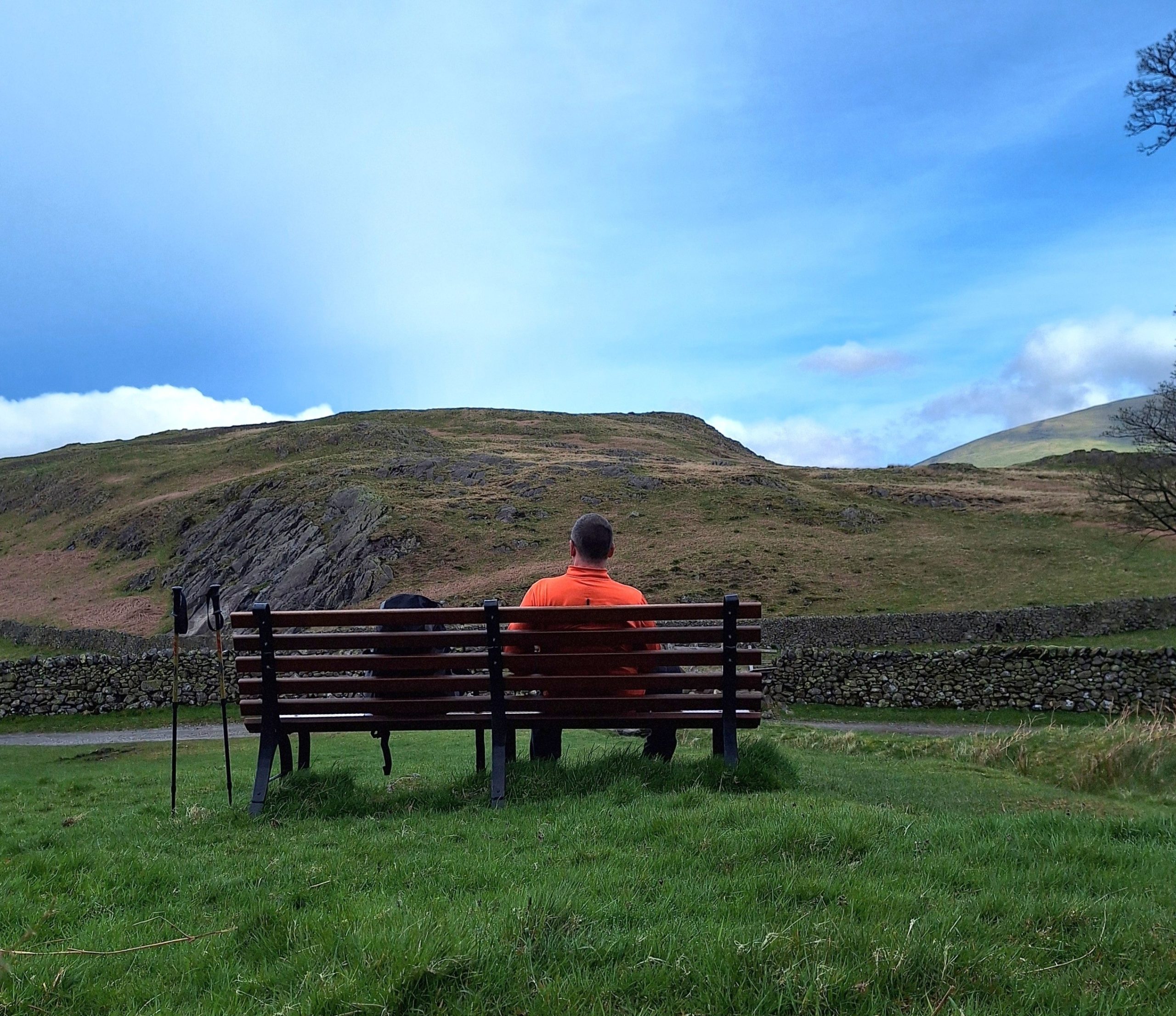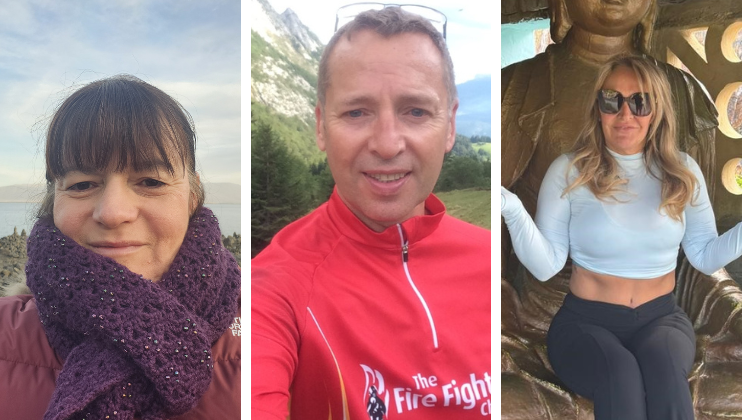This year’s theme for Mental Health Awareness Week was centred on movement – something many of us within The Fire Fighters Charity try to incorporate into our lives as much as possible, but for the physical and mental health benefits.
Here, our Director of Beneficiary Services, Sharon Bailey, our Sales Manager, Kevin Biles, and our Community Fundraiser, Lisa Courtney, share how they manage their mental wellbeing and how movement benefits them personally:
Sharon Bailey, Director of Beneficiary Services:

- How do you manage your mental wellbeing day-to-day, for example, are there any hobbies you have which help you to ‘switch off’ and improve your wellbeing?
Various ways – spending time with family and friends is important. If I need quiet, reflective time then crochet is my go-to hobby – it helps me slow down, focus the mind and relax. Crochet can help reduce cortisol (the stress hormones) and the repetition of a craft such as crochet helps release the feel-good hormone, serotonin.
I also enjoy swimming – recently I have been using the outside pool at my gym and have found it very therapeutic – even when it’s been raining! When I am in the water, I manage to clear my mind and find a state of peace, plus I can’t take my mobile phone with me and that helps!
- Do you think moving more (the theme of this year’s awareness week) helps you?
Yes, I have just started visiting the gym more and I am trying different classes – what has been great has been finding new ways to help my health and wellbeing which are not based on the ‘traditional’ gym set up such as using the weights or cardiovascular equipment. I have tried dance fitness (despite a lack of coordination!), a Barre class and Spirit which combines elements of yoga, Pilates and meditation. Using mindful movement can be so powerful, it helps centre the mind as you focus on the movements and your breathing. It can be energising and also aid better sleep.
- How do you manage a work/life balance?
This has been a challenge at times. The charity and the people we support is incredibly important to me and I want to give my best every day. I want to be there to support our amazing teams and provide the best service we can.
I realise, however, to do this I need to look after my wellbeing, self-care is important, however sometimes I need to check in to remind myself of this. Since I have rejoined the gym I have improved my work life balance, I book classes for after work and commit to attending – I ignore the gremlin on my shoulder telling me not to switch the laptop off! Once I have exercised and switched off from work, I do feel better and it means I approach the next day with renewed energy and focus. When I travel with work I ensure I take a crochet project with me so I have something else I can switch to in order to wind down.
- What everyday practices help you to build your resilience? And what would you recommend to beneficiaries?
Setting goals helps, especially relating to exercise and eating healthily. I’m not perfect and I have my blips but it’s important not to beat yourself up if you do have a blip. Tomorrow is another day! I try to practice positive thinking and stay optimistic, understanding setbacks are temporary and I can overcome any challenges I face is key.
Building ‘me’ time into my day is critical. I am a nurse by profession, and I want to help others – so I can often put others’ needs before mine and this leaves little time for myself. I am slowly learning self-care isn’t selfish – it’s not easy though! Whether it’s time out to read, listen to music, crafting, exercise or cooking – whatever you enjoy doing, find that time and invest in your own wellbeing. I recall an article written by one of our psychological therapists using the oxygen mask analogy – this stuck with me – just as the oxygen mask procedure instructs passengers on a flight to secure their own mask before aiding others, prioritising self-care is essential. We can’t help others if we don’t look after our own wellbeing.
- Do you find talking to friends/family/colleagues is beneficial to you when it comes to managing your wellbeing, particularly at challenging times?
Yes – I am incredibly lucky I have supportive family, friends and colleagues, both local to me and many miles away. I know that they are always there for me as I am for them. Sometimes it’s hard, I’m back in that world of being a nurse, someone who helps, and so I don’t want to show a crack in the armour, I need to be the strong one. Then I give myself a talking to – talking about our feelings is not a sign of weakness, it is part of taking charge of your wellbeing and doing what you can to stay healthy, it can be incredibly empowering and often a relief to share how we are feeling.
Kevin Biles, Sales Manager:

- How do you manage your mental wellbeing day-to-day, for example, are there any hobbies you have which help you to ‘switch off’ and improve your wellbeing?
Being outside to escape, either on my own or in a group – whether that’s a running group, walking, mountain leading/hiking or supervising a Duke of Edinburgh (D of E) Award group.
My main ‘escape’ though is a run or a walk completely on my own, on trails, woodlands, forest, hills and sometimes mountains, usually before work as this sets me up for the day. The more remote the better! If I can include a wild camp or a stop-over, then even better.
My work is very people orientated, I spend a lot of time either face-to-face, online or on the phone throughout the day, and so these runs or walks are my ‘switch off’ time, taking in everything around me, birds, animals, flowers, countryside and trees… lots of trees!
- Do you think moving more (the theme of this year’s awareness week) helps you?
Moving definitely helps… and as I’m getting older, my running is slowing down and walking taking over, but that brings with it more time to take more in, slowing down the pace.
- How do you manage a work/life balance?
I’ll be honest and say I don’t think I do manage my work/life balance as well as I could. Work takes up a huge part of my day. But, this is where I do recognise the signs when it gets too much, and I have developed my own ‘personal support mechanism’ and will take myself outside to re-set doing one or a number of activities mentioned above.
I really struggle at times with the fast-paced ‘information now’ mode that we all seem to work in, and whilst I may recognise it in others and sometimes even suggest they take a break, like most (actually) all of us, we don’t practice what we preach. I will find a point when I know I need to ‘get outside and escape’ and that could be for an hour or it could be several days with a tent, walking boots and a stove to make a brew!
- What everyday practices help you to build your resilience? And what would you recommend to others?
I will test myself and I love taking myself out of my comfort zone. That could be a mountain range that I need to trek through, it could be a long distance run or walk, or it may be putting myself in a situation that is not ‘run of the mill’.
More recently this now includes teaching youngsters (through D of E) how to navigate, how to set up camp, how to cook and how to respect the countryside. I am not a teacher, but when you see youngsters of all ages and abilities succeed in their expeditions and challenges, you can’t beat it. And their success is my success.
In summary, to build resilience, I sometimes throw myself into a challenge or situation that initially is uncomfortable, or not achievable (at that time), but with training, focus and pushing my boundaries… most of the time I will achieve them, and on occasion when I don’t, I’ll look back and either give it another go, or re-set the goal if necessary, but ensure it still takes me out of my comfort zone.
Lisa Courtney, Community Fundraiser:

- How do you manage your mental wellbeing day to day, for example, are there any hobbies you have which help you to ‘switch off’ and improve your wellbeing?
My mental wellbeing can depend on how I wake up, so I have learnt to live in the moment rather than worry about my past or what may happen in the future.
Most days I’m happy, energetic and thankful, I appreciate the outside, and enjoy exercise. I love Pilates, hiking and taking my two dogs out for long walks. I try to take at least 10 minutes in the day to switch off and take myself away from the noise, as well as jotting down in my journal things that I have gratitude for.
However, some days I wake up and it’s there, a dark cloud is how I describe it. I feel emptiness, sadness and hopeless. And I don’t want to talk to anyone.
People notice this as I’m very joyful most of the time. So, I make a point of wanting to talk about my mental health so if I’m in that dark place I can say to my family and colleagues ‘the big black dog is here’ and they now understand not to ask why, they allow me to process the journey and respect my honesty.
2. Do you think moving more (the theme of this year’s awareness week) helps you?
Absolutely, being active changes the scenery and allows you to focus on the present.
3. How do you manage a work/life balance?
I’m very lucky to have a great support network around me. The Fire Fighters Charity really supports me by allowing me to be flexible in my working hours, so if I feel the need to go outdoors for a walk in the day, I flex my hours to suit how I feel.
This helps me to be more productive and in tune with my mind and body. Being a fundraiser means sometimes we get unsocial hours or long journeys in the car, but my manager always checks in and reminds me that burnout can easily happen, so I manage my time effectively.
4. What everyday practices help you to build your resilience? And what would you recommend to others?
Journalling. I have been doing it for years. I’m also reading a book called Lunar Living by Kirsty Gallagher which provides me with a toolkit to understanding moon cycles and the effects they have on us, and how working with them can help you live a more purposeful life. Mindfulness and focusing on the present day really help me.
5. Do you find talking to friends/family/colleagues is beneficial to you when it comes to managing your wellbeing, particularly at challenging times?
Being open and honest is the secret to living with my illness. I love to share how I feel, it helps to get a different perspective on the way I feel.
6. Has the charity been supportive? If so, how?
The charity supports me by allowing me to be my authentic self. I can talk openly about how my day is, good or bad. I use the My Fire Fighters Charity app for bitesize resources and online self-help too.
How did you mark Mental Health Awareness Week? Let us know by sharing your photos and videos on social media and tagging us, or post them in one of our groups in My Fire Fighters Charity.

